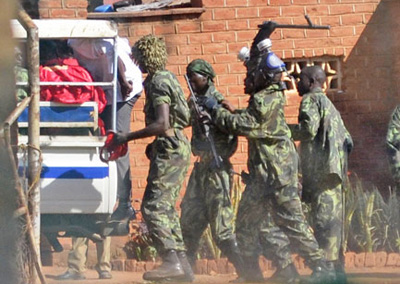End-of-Mission press releases include statements of IMF staff teams that convey preliminary findings after a visit to a country. The views expressed in this statement are those of the IMF staff and do not necessarily represent the views of the IMF’s Executive Board. Based on the preliminary findings of this mission, staff will prepare a report that, subject to management approval, will be presented to the IMF’s Executive Board for discussion and decision.
A team from the International Monetary Fund (IMF), led by Mr. Oral Williams, visited Lilongwe from October 29−November 12, 2014 to conduct discussions for the fifth and sixth reviews under Malawi’s Extended Credit Facility (ECF) arrangement.
At the end of the mission, Mr. Williams issued the following statement:
“Preliminary indications are that economic activity has demonstrated considerable resilience. Real Gross Domestic Product (GDP) growth for 2014 is projected between 5 and 6 percent, with contributions from the agriculture and retail trade sectors. However, inflation remains high, in part because of uncertainties about the resumption of budget support.
“Policy implementation continues to take place under difficult circumstances. Shortfalls in budget support due to the “cashgate scandal” have led to challenges in the execution of the previous and current year’s budget, with increased recourse to costly domestic financing and the accumulation of significant domestic debt. At the same time, the exchange rate has weakened considerably, exacerbating inflationary pressures. The depreciation is in part seasonal, as the economy has entered the “lean season” where export-related foreign exchange receipts are low. However, this has been compounded by ongoing shortfalls in budget support.
“Discussions focused on the policies necessary to return the economy to a strong, noninflationary, and inclusive-growth trajectory. Significant agreement has been reached in a number of important areas. These include on fiscal policy, where the authorities intend to follow a restrained stance, and on monetary policy, which will remain tight until inflation returns to a clear, declining trend. The mission emphasized the need to exercise greater control over spending commitments in line with available financing to avoid the accumulation of additional debt. It also noted that containing spending within approved ceilings would allow fiscal policy to be supportive of monetary policy and mitigate the impact of inflation on the most vulnerable segments of the population. The mission noted, however, that despite a favorable outlook for international food and fuel products, the policy actions required to bring inflation to single digits would likely entail some slowing of economic growth in 2015.
“The authorities reiterated their commitment to strengthen public financial management systems and to be guided by the gaps identified in the recently released forensic audit report. The mission views implementation of meaningful reform in this area to be crucial in supporting the macroeconomic policy stance and boosting private sector confidence. This will in turn help catalyze investment required for strong growth over the medium term. To this end, at the invitation of the authorities, an IMF technical assistance mission is currently in Lilongwe assisting in identifying key measures to safeguard government fiscal systems going forward, including through improved accountability, transparency, and the establishment of oversight systems to enforce existing rules and regulations. Discussions with donors emphasized that vigorous implementation of reforms in this area would be a precondition for a resumption of budget support.
“The mission will continue to work with the authorities in addressing these challenges in the weeks ahead. Assuming a successful resolution of remaining issues, it is anticipated that a request to complete the Fifth and Sixth reviews under the ECF-supported program could be submitted for consideration by the IMF’s Executive Board in early 2015.”
“The mission held discussions with Finance Minister Goodall Gondwe, Reserve Bank of Malawi (RBM) Governor Charles Chuka, Secretary to the Treasury Ronald Mangani, other senior government and RBM officials, a broad range of national stakeholders outside government, as well as representatives of Malawi’s development partners.
“The mission expresses its gratitude for the constructive spirit in which discussions were held.”
The ECF is the IMF’s main tool for medium-term financial support to low-income countries. It provides for a higher level of access to financing, more concessional terms, enhanced flexibility in program design, and more focused, streamlined conditionality. Financing under the ECF currently carries a zero interest rate, with a grace period of 5½ years, and a final maturity of 10 years.

.jpeg&w=60&q=100&h=60)




.jpeg&w=60&q=100&h=60)





